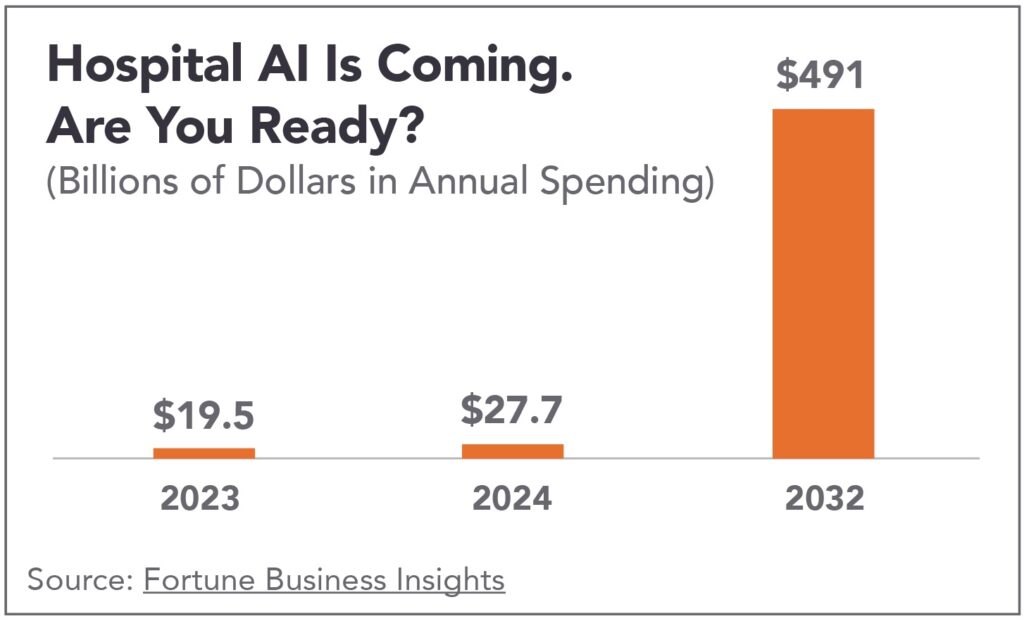Note: The authors are working together on a system project at Inspira Health, Southern New Jersey’s leading network of healthcare providers, delivering the full continuum of primary, acute, and advanced care services.
The pressure on hospitals to launch AI is intense. After all, AI promises more efficient patient management, better diagnostics, operational efficiencies, improved quality, and stronger compliance…the list is long.

But the foundation for effective AI requires that hospital data be accessible and accurate across applications. Unfortunately, this is rarely the case due in part to challenged applications integrations, absence of thorough interoperability, or untrusted data. Without comprehensive data, AI investments may bring more problems than solutions, such as:
- Privacy breaches or incomplete data use. As AI systems bump up against sensitive patient data that is behind multiple firewalls, analyses can be incomplete, or breaches can occur.
- Operational headaches. The new AI systems overlaid on multiple or external data systems may require manual intervention, downtime, and constant troubleshooting.
- Inaccurate findings and recommendations. Responsible AI is dependent on the relevancy, accuracy, and availability of the volumes of information specific to unique healthcare entities. The data must be trusted. Without this, outcomes and recommendations can be wrong or misleading.
The Solution: Work Toward Achieving an Integrated Data Ecosystem
Achieving an integrated data ecosystem requires a long-term commitment and adequate resources. It’s no small matter. In terms of scope, an integrated data ecosystem must reflect the entire network of data-related processes, technologies, stakeholders, and interactions within an organization or across multiple organizations. This would include various elements such as data sources, data integration tools, data warehouses, data lakes, analytics platforms, business intelligence tools, and the people who manage and use these resources.
The primary goal of a data ecosystem is to create an immutable comprehensive secure environment where data can flow seamlessly and securely across different systems while being integrated, analyzed, and utilized to derive insights and drive business decisions.
Without achieving—or significant progress toward—this objective, any use of AI is likely to fall short. How does a healthcare system get there?
Five Key Components of Data Ecosystem Integration Success
To achieve an integrated data ecosystem, we recommend these essential five considerations:
- Make Sure Your Team Has the Skill and Expertise. Building and managing a data ecosystem requires specialized skills in data engineering, data architecture, data governance, and possibly cloud infrastructure management. Hospitals may need to invest in training or hire skilled professionals to successfully implement and maintain a data ecosystem.
- Adequately Fund the Initiative. While a data ecosystem can reduce costs and improve population health in the long run through improved efficiency and decision-making, the initial investment in infrastructure, technology, and human resources can be substantial. Hospitals need to carefully assess the costs and benefits.
- Commit to Interoperability and Meeting Standards. Ensuring secure interoperability between different systems and adherence to data standards (such as HL7 or FHIR) is essential for seamless data exchange and integration within the data environment—all necessary for effective AI programs.
- Prepare the Organization Through Change Management and Adoption. Introducing a data ecosystem involves organizational change and adoption challenges. Stakeholders across the hospital, including clinicians, administrators, and IT staff, need to be educated about the benefits of the data ecosystem and trained on how to effectively use and interpret data analytics.
- Address Ethical and Privacy Concerns. Patient privacy, consent, and data ownership are vital. Hospitals must implement policies and practices that prioritize patient confidentiality and comply with ethical guidelines when handling and sharing patient data.
Now You’re Ready for the AI Payoff
With a solid data ecosystem, your hospital is better situated to apply AI and realize its many benefits, from enhanced data utilization and population health management to cost efficiency, more innovation, and better collaboration.

